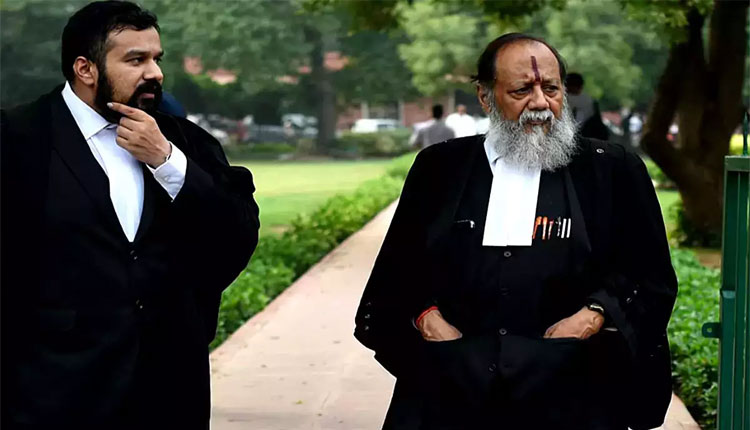Lucknow: As the anticipation for the consecration of Ram Lalla at the Shri Ram Janmabhoomi temple in Ayodhya intensifies, the ongoing court proceedings regarding the survey of Shri Krishna Janmabhoomi in Mathura have sparked much debate and discussion.
Central to these significant legal battles is the renowned father-son duo, Advocate Harishankar Jain and his son Vishnu Jain, who have consistently represented the Hindu side, earning widespread recognition for their dedication to upholding Hindu religious rights.
A Legacy of Legal Advocacy Rooted in Family Values
Hailing from Lucknow, Uttar Pradesh, Advocate Harishankar Jain embarked on his legal career in 1976, initially practicing at the Allahabad High Court before transitioning to the Supreme Court of India. His unwavering commitment to justice and his deep-rooted family values, instilled by his mother, played a pivotal role in shaping his journey as a legal advocate.
After the passing of his mother on December 6, 1992, Advocate Jain experienced a profound emotional loss, but her teachings remained deeply etched in his soul. It was these values that ignited his passion for representing the Hindu side in the Ayodhya Shri Ram Janmabhoomi-Babri Masjid dispute. On December 20, 1992, just days after his mother’s thirteenth-day commemoration, he filed a petition on behalf of the Hindus before the Allahabad High Court.
Notably, Advocate Jain received an offer to represent the Muslim side in the Ayodhya case, but his unwavering commitment to his beliefs prompted him to decline the proposal.
Venturing into the Political Arena
Beyond his legal pursuits, Advocate Jain ventured into the political realm, contesting the 1993 Lok Sabha elections from Amethi against the then-Congress President, Sonia Gandhi. Despite the electoral outcome, his challenge to Sonia Gandhi’s election based on her Italian citizenship and his subsequent legal battle against the validity of Section 5(1)(c) of the Citizenship Act, 1955, demonstrated his unwavering commitment to justice and the rule of law.
Vishnu Jain: Carrying the Torch of Advocacy
Inheriting his father’s passion for law, Vishnu Jain, born on October 9, 1986, followed in his father’s footsteps, graduating from Balaji Law College in 2010 and practicing under his father’s guidance. In 2016, Vishnu Jain joined his father in representing the Hindu side in the Shri Ram Janmabhoomi case, demonstrating their remarkable teamwork and dedication to the cause.
A United Front: Fighting for Hindu Religious Rights
Together, the father-son duo has represented the Hindu side in over 100 cases related to Hindu religion. Their involvement in the Shri Ram Janmabhoomi Mandir-Babri Masjid dispute, which culminated in a historic victory for the Hindus, stands as a testament to their unwavering commitment to upholding religious rights.
Their legal battles extend beyond Ayodhya, encompassing the Shri Krishna Janmabhoomi case in Mathura, the preservation of Hindu-Jain temples demolished by Muslim invaders, the challenge to the legitimacy of the Qutub Minar’s construction, claims regarding the Taj Mahal’s origins as a Shiva temple, and the fight against the Places of Worship Act and the Waqf Act 1995. The duo is also representing the Hindu side in the ongoing Shri Kashi Vishwanath Temple-Gyanvapi Mosque dispute in Varanasi.
Facing Challenges with Determination
Despite facing occasional setbacks, such as Advocate Harishankar Jain’s removal from the Gauri Shringar case, the Jain duo remains steadfast in their mission to protect Hindu rights.
Speaking to the media, Advocate Harishankar Jain revealed that his father, Nem Chandra Jain, a judicial services officer, initially opposed his pursuit of a legal career in the high court. However, his unwavering determination and commitment to justice eventually won his father’s approval.
The Jain father-son duo’s unwavering dedication to upholding Hindu religious rights and their tireless efforts in numerous legal battles have earned them widespread recognition and respect. Their legacy as staunch defenders of Hindu interests continues to shape the legal landscape of India and inspire future generations of legal advocates committed to preserving religious freedom and cultural heritage.



Comments are closed.